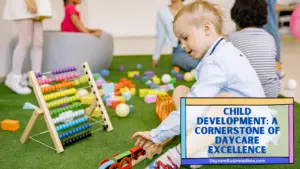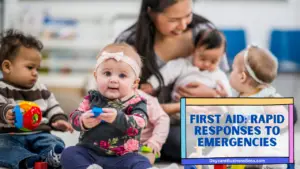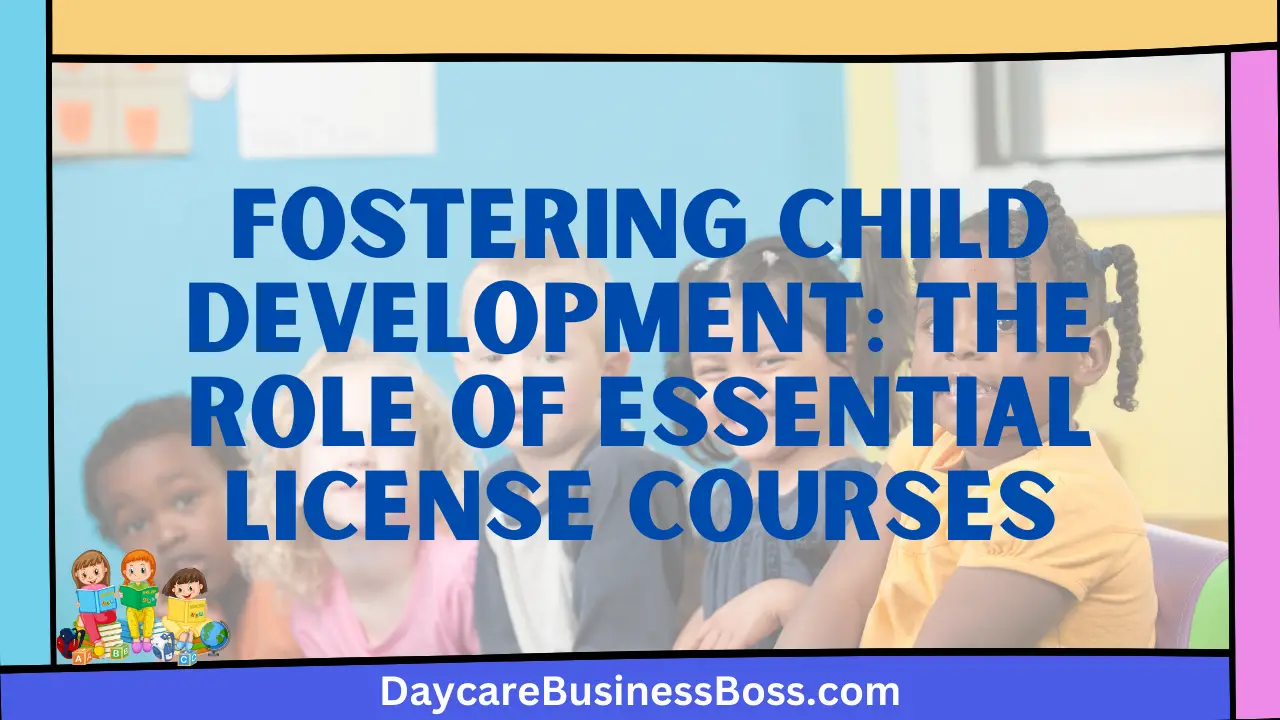Behind every thriving childcare center is a passionate and skilled provider with a unique combination of compassion, abilities, and competence. But how does one confidently embark on this fruitful journey? The answer comes in the comprehensive daycare licensing courses, which serve as a guiding light toward developing a flourishing and effective profession in childcare.
To best prepare yourself for a career in daycare provision, you should enroll in license courses that provide comprehensive coverage of essential subjects such as child development, safety, health, first aid, nutrition, and regulations.
Child Development: A Cornerstone of Daycare Excellence

Effective childcare provision is founded on a thorough understanding of child development, and it serves as the foundation for fostering the development of young minds. Prospective daycare provider license classes provide a complete understanding of the numerous phases of children, including cognitive development, emotional maturation, and social dynamics.
These lectures dive into the complexities of child development, revealing the mysteries of how young minds develop. They give aspiring childcare providers the tools they need to understand the subtleties of cognitive development, allowing them to build environments that encourage curiosity and learning. Providers can customize activities and interactions to foster optimum mental development by recognizing the distinct cognitive milestones at different ages.
These courses emphasize the importance of emotional well-being during childhood. Daycare providers may establish safe environments for children to express themselves by understanding their emotional growth patterns. This promotes a good sense of self and the ability to properly manage emotions, laying the groundwork for healthy emotional growth.
Another crucial part of child development that licensure courses address is the social aspect. Providers acquire insight into the complex realm of children’s social connections. They can use this knowledge to build positive connections and communication skills, which are important not just for current interactions but also for shaping future interpersonal dynamics.
The value of these courses resides in their ability to equip daycare providers with the tools they need to create tailored care plans. With a thorough understanding of child development, providers may provide customized support that is tailored to individual requirements. This adaptability promotes an atmosphere in which children can thrive, ensuring that their developmental path is supported and guided.
Read more about: Ensuring Child Safety and Development: The All-Inclusive Daycare Employee Checklist
Safety and Security: Ensuring a Protected Environment
The necessity of a safe environment cannot be stressed in the domain of daycare facilities. This safety foundation is a non-negotiable cornerstone, and licensure courses play a critical role in solidifying this commitment. These extensive seminars dig into key safety precautions, ensuring that daycare providers are knowledgeable about all elements of child safety.
License classes cover a wide range of safety factors that are essential for a safe daycare setting. Childproofing approaches take center stage, empowering providers to recognize possible hazards and take proactive efforts to prevent them. Daycare workers create a safe refuge for young explorers to pursue their curiosity by rigorously childproofing their spaces.
Another important aspect of this training is emergency procedures. Providers are taught to manage a variety of situations with precision and calm. License courses prepare professionals to manage emergencies while protecting the safety and well-being of the children in their care, from minor scrapes to more serious scenarios. This preparedness not only protects the children but also gives parents confidence in entrusting their most valuable possessions to the hands of the daycare.
As a core skill, license training emphasizes hazard recognition. Providers are taught to spot potential hazards that untrained eyes could miss. This increased awareness helps them to address hazards in advance, preventing accidents before they occur. Daycare experts who take this proactive approach create an atmosphere in which children can thrive while avoiding avoidable dangers.
Daycare providers who internalize these safety practices become trust ambassadors for parents. With extensive experience, they can confidently ensure parents that their children are in a safe setting. This assurance is vital to parents who want to know that their children are being protected and developed in every manner possible.
Health and Hygiene: Prioritizing Wellness
The importance of health and hygiene in molding children’s growth and well-being cannot be overstated. License classes, which are designed to teach complete information to daycare providers, become the conduits via which these critical features are woven into the fabric of childcare. These courses, which include issues such as adequate hygiene, illness prevention, and nutrition, provide daycare staff with knowledge that extends far beyond the classroom.
The complex importance of health and hygiene is revealed within the scope of these courses. Proper sanitation procedures are explained, providing providers with the tools they need to keep children’s environments clean and safe. From scrupulously cleaning surfaces to regularly disinfecting toys and play areas, these steps work together to produce environments that foster rather than threaten young life.
Another important aspect of these courses is illness prevention. Daycare workers learn to recognize the signs and symptoms of common childhood illnesses, allowing for early detection and intervention. This information functions as a protective shield, limiting the spread of illnesses and ensuring the health of youngsters. Providers aggressively protect the physical well-being of children by recognizing and addressing any health risks as soon as they arise.
The emphasis on nutrition in licensure classes is also critical. The ideas of balanced meals and suitable portion amounts for growing bodies are taught to providers. With this knowledge, daycare staff may create menus that meet the nutritional needs of children, promoting healthy growth and development. Providers create the framework for lifelong healthy eating habits by providing nutritious meals and snacks.
Aside from these specific components, the combination of health and hygiene practices results in a comprehensive approach to childcare. License classes enable providers to foster an environment in which children’s well-being is prioritized. Daycare providers contribute to the total growth and flourishing of the children in their care by combining good sanitation, illness prevention, and nutrition. This holistic approach is a commitment to fostering the physical foundation upon which these young lives are created, not just a responsibility.
First Aid: Rapid Responses to Emergencies

Accidents are unexpected in the area of childcare, reminding us of the critical need for readiness. License classes, which serve as the foundation of daycare providers’ knowledge, dive into the field of first aid abilities, reinforcing their status as skilled crisis responders. With topics ranging from CPR and choking relief to wound care, these courses prepare daycare staff to be alert guardians, ready with the expertise to manage unforeseen situations quickly and confidently.
The importance of quick response is explicitly underlined within the context of these courses. Providers are better prepared to handle situations with calm and precision after learning essential first-aid skills. The procedures of cardiopulmonary resuscitation (CPR) are deconstructed, allowing clinicians to commence life-saving interventions in the case of a cardiac arrest. Choking relief maneuvers become automatic, ensuring that airways are cleaned and breathing is resumed as soon as possible.
Licensure classes teach daycare providers how to manage wounds. These abilities, which range from cleaning and dressing wounds to spotting symptoms of infection, enable caregivers to not just relieve pain but also prevent problems. Providers can establish a safer atmosphere for children to explore and play by learning wound care standards.
These courses give training that goes beyond skill learning. It builds providers’ confidence, which is essential in high-pressure situations. Daycare workers approach their tasks with a newfound sense of purpose, knowing that they can make a difference. This assurance spreads to the children’s families, who commit their most precious loved ones to these caregivers.
The significance of being prepared cannot be emphasized. Daycare providers can use license classes to quickly analyze circumstances and respond efficiently. In emergencies, these caregivers become beacons of stability, guaranteeing that the children’s well-being is protected even in the face of adversity.
Read more about: Every Detail Counts: Your Child’s Safety in the Home Daycare Inspection Checklist
Nutrition: Fueling Healthy Growth
Proper nutrition emerges as a foundational thread in the complicated tapestry of children’s development, weaving a route toward robust growth and well-being. In the sphere of childcare provision, license courses serve as guiding lighthouses, exposing the importance of feeding through insights into age-appropriate menus, dietary limitations, and developing healthy eating habits. This knowledge enables daycare providers to be health architects, designing foods that nourish not only children’s bodies but also their futures.
License courses go into the complex art of age-appropriate diets, acknowledging that different developmental phases necessitate diverse nutritional concerns. Providers know to create menus that meet the changing needs of developing bodies. These courses guarantee that children receive the nutrients they require for optimal development from infancy to toddlerhood and beyond. This understanding reduces the danger of nutritional gaps, laying the groundwork for physical and cognitive development.
Dietary limitations are another important aspect of these courses. As providers gain experience, they become more competent at handling the complexity of allergies, sensitivities, and dietary preferences. This knowledge enables them to construct inclusive meal plans that meet the dietary needs of every kid, ensuring that no child falls behind owing to nutritional constraints. Daycare professionals use this accommodation to create an atmosphere in which children can thrive, regardless of their nutritional needs.
Perhaps equally important is the development of healthy eating habits. The significance of providers as nutritional role models in shaping children’s eating attitudes is emphasized in license courses. Providers build the framework for a lifetime of great eating habits by instilling healthy habits early on. This affects children’s long-term health and connection with food outside the childcare setting.
The tremendous influence of this understanding pervades the care providers provide. Nutrition insights enable providers to ensure that children obtain the vital nutrients needed to sustain their energy levels and promote their growth. This promotes not only physical development but also cognitive performance, emotional well-being, and general vitality in youngsters.
Regulations: Navigating the Legal Landscape
Regulations are crucial safeguards woven into the complicated fabric of the childcare business to ensure the well-being of the children in its care. License classes emerge as critical channels for daycare providers, providing a thorough comprehension of these rules. These courses prepare providers to manage the industry’s regulatory currents with confidence and skill by delving into the intricate world of licensing regulations, health and safety standards, and legal restrictions.
The license classes are designed to provide a thorough understanding of the regulations that govern the daycare business. Providers learn about the complexities of licensing regulations, including as personnel ratios, facility standards, and educational credentials. This knowledge ensures that providers operate within the legal framework, allowing them to build and manage daycare centers that fulfill regulatory bodies’ minimum standards.
Health and safety standards are at the heart of these programs. Protocols covering everything from sanitization and emergency procedures to childproofing and nutrition are taught to providers. This thorough understanding enables providers to develop an atmosphere that prioritizes the well-being of children, reducing potential hazards and establishing safe spaces for children to grow.
Legal rules about the daycare industry are also addressed in license courses. Providers learn about liability, insurance, and other legal issues, allowing them to make informed decisions that protect both the children and themselves. This legal literacy aids daycare providers’ professionalism by ensuring that they work ethically and responsibly within legal constraints.
This information has practical ramifications that go beyond basic compliance. By following regulations, providers demonstrate their dedication to providing high-quality treatment. Providers that are well-versed in industry standards comfort parents looking for a safe and caring environment for their children. This focus on regulatory compliance not only instills trust but also reflects providers’ commitment to maintaining the best levels of care.
Frequently Asked Questions

Why should I consider taking daycare-providing license courses?
Enrolling in childcare provision license classes provides a complete education that covers critical topics such as child development, safety, health, first aid, nutrition, and regulations. These courses will offer you the information and skills needed to provide high-quality care for children, guaranteeing their well-being and development in a safe and supportive environment. By taking such classes, you will distinguish yourself as a competent and knowledgeable daycare worker, attracting parents looking for the best care for their children.
How can licensure classes help me build a supportive atmosphere for children?
License courses go beyond theoretical knowledge by emphasizing practical skills essential for providing a supportive environment in a daycare setting. These courses teach effective communication with both children and parents, problem-solving skills for potential obstacles, and emotional intelligence to understand and treat the emotions of children. By mastering these skills, you will be able to establish an environment in which children feel valued, protected, and emotionally supported, thereby laying the groundwork for positive growth and development.
What role do regulations play in the provision of daycare services, and why are they addressed in license courses?
Daycare regulations are critical to ensuring the safety and well-being of children in your care. Regulations are covered in license courses to assist you navigate the legal landscape, comprehending licensing requirements, and complying with health and safety standards. By being acquainted with these regulations, you will not only demonstrate your commitment to providing high-quality care, but you will also avoid potential legal hazards. This understanding enables you to run your daycare center with confidence and integrity, while also establishing trust with parents and authorities.
To learn more on how to start your own daycare checkout my startup documents here.
The information provided by DaycareBusinessBoss.com (“The Site”) is for general informational purposes only. All information on the Site is provided in good faith, however, we make no representation or warranty of any kind, express or implied, regarding the accuracy, adequacy, validity, reliability, availability or completeness of any information on the Site. Under no circumstance shall we have any liability to you for any loss or damage of any kind incurred as a result of the use of the Site or Reliance on any information provided on the Site. Your use of the Site and your reliance on any information on the Site is solely at your own risk.
This blog post is for educational purposes only and does not constitute legal advice. Please consult a legal expert to address your specific needs. Terms and Conditions. (https://daycarebusinessboss.com/terms-conditions/)

Meet Shawn Chun: Entrepreneur and Childcare Business Fan.
I’m a happy individual who happens to be an entrepreneur. I have owned several types of businesses in my life from a coffee shop to an import and export business to an online review business plus a few more and now I create online daycare business resources for those interested in starting new ventures. It’s demanding work but I love it. I do it for those passionate about their business and their goals. That’s why when I meet a childcare business owner, I see myself. I know how hard the struggle is to retain clients, find good employees and keep the business growing all while trying to stay competitive.
That’s why I created Daycare Business Boss: I want to help childcare business owners like you build a thriving business that brings you endless joy and supports your ideal lifestyle.


